Today we find ourselves in a historical moment in which green ideas have gained, in many parts of the world, unprecedented levels of engagement. As older-rooted traditions continue to see growth and renewal, fresh patterns of ecological thought sprout and branch off the existing. The result: an incredibly diverse, rich, and experimental body of thought criss-crossing borders both geographic and disciplinary to call for change in the face of ecological breakdown.
From deep ecology to ecomodernism, and from ecofeminism to collapsology, the many streams of political ecology form a living, evolving whole that is complex and, at times, contradictory. With this in mind, the Green European Journal has put together a selection mapping some of the major currents that have shaped political ecology in recent years and which continue to do so. Traversing fiction through academia, we explore why the following six contributions have been indispensable to the vast field of green thinking.
The Overstory by Richard Powers (2018, W.W Northon & Company)
A REVIEW BY EDOUARD GAUDOT
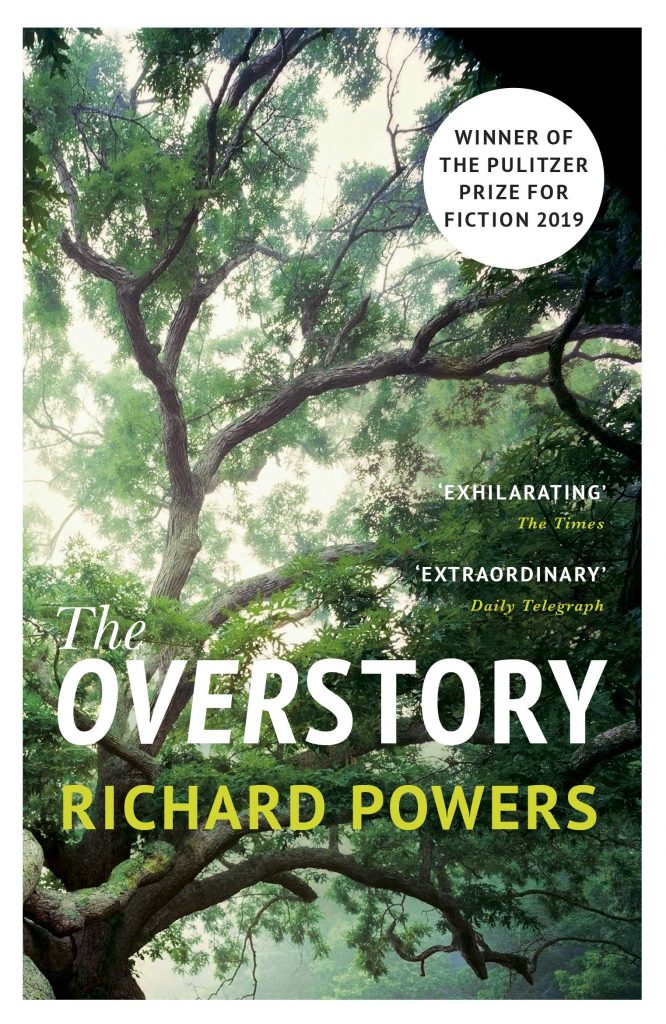
What does a Pulitzer Prize for Fiction have to do with political ecology? Well, 2019 prize winner The Overstory is not just the beautiful and breathtaking tale of a cluster of individuals connected to, and by, their love of trees in various forms. From roots to seeds, Powers’ novel unfolds in the pattern of a tree, like the giant Californian redwoods that are central characters in this story of growing awareness about the living and the need to protect them against profit-driven industrial aggression, or sheer administrative carelessness. From hard branches to soft leaves, it intertwines nine human destinies and leads them to discover, celebrate, and defend the forest as the great rhizome of life that connects us all.
Throughout the 1970s’ first environmentalist movements, the tree sitting of the 1990s, the anti-globalisation Seattle protests of 1999, and the post 9/11 crackdown on activism, individuals may have felt lost when faced with the harsh reality woven by the callous threads of power, money, and society. The desire to conform is often the most powerful incentive to let things happen, and even contribute to their happening. Tragic and beautiful, epic and grotesque, the destinies of The Overstory offer a deep meditation on the irreparable psychic damage that manifests in our unmitigated separation from nature. But from the individual sense of purpose to the collective action it triggers, The Overstory also offers a much-needed narrative of a change of scale in terms of comradeship and collective action the world over.
Fiction is not only a powerful tool for giving life to our desires, imagination, and aspirations. It is also a source of knowledge. It showcases and experiments on the world and humans. An important trend in the literature of recent years has been the germination of ecosystemic and ecological thinking – something which allows for the telling of different kinds of stories than the tales rooted in drama and melodrama that abounded in the 20th century.
Whether utopian, dystopian, or neutral, fiction represents a great portal to the worlds of political ecology. While Powers’ most recent book stands out as a more classical work of literature, it is part of a distinctive literary movement which counts among it the likes of Margaret Atwood, Paolo Bacigalupi, Ursula K. Le Guin, Barbara Kingsolver, Amitav Ghosh, and Kim Stanley Robinson. In good company, Richard Powers’ powerful eco-novel can take its place on the shelves of our political travel guides to the journey towards a better world.
Green Growth, Smart growth: A New Approach to Economics by Ralf Fücks (2015, Anthem press)
A REVIEW BY RODERICK KEFFERPÜTZ
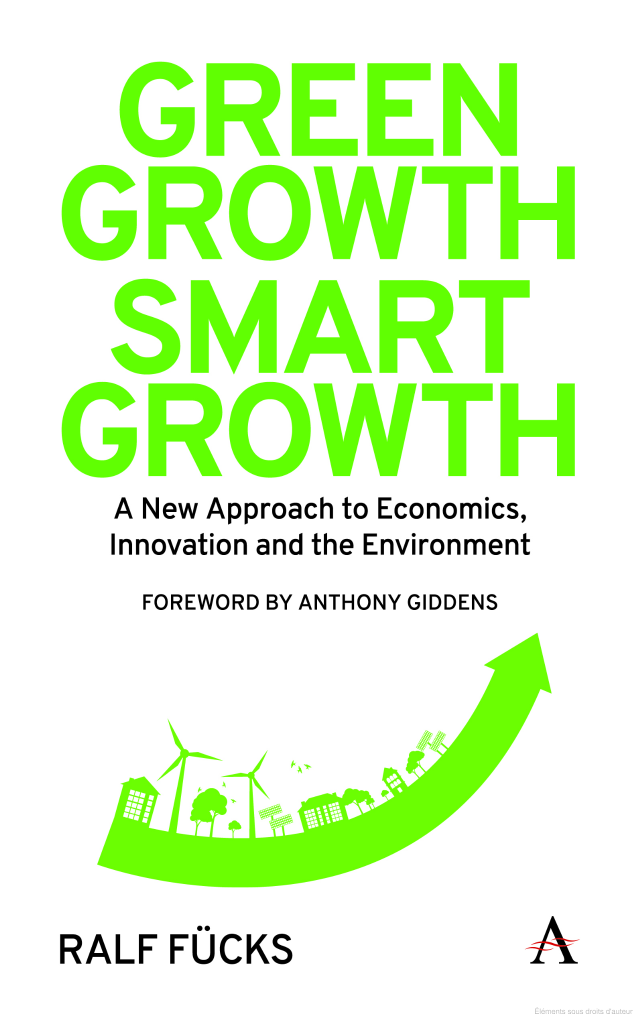
German philosopher Peter Sloterdijk once wrote that continuing business-as-usual is criminal, but that an ethic of renunciation and self-denial is naïve; the intelligent approach would lie somewhere between. This quote is the guiding principle in Ralf Fücks’ Green Growth, Smart Growth.
In the debate on the right strategy against climate change – degrowth or sustainable growth – Fücks is a staunch advocate of the latter. We do not need appeals to extreme frugality or zero growth. What is needed, Fücks argues, is technological, political, and social innovation and progress that allows us to enter a new stage of industrial modernity: “a shift from a fossil-based to a post-fossil economy, from the ruthless exploitation of nature toward growth in tandem with it, decoupling economic growth from environmental consumption.”
The first half of the book’s 390 pages is dedicated to the environmental crisis. Fücks outlines the economic rise of developing countries, the emergence of a new global middle class, the demographic development, the shift in globalisation, and the stress all of these factors put on nature. He explains how civilisation depends on three elements: a stable climate, fertile arable land, and intact water cycles. Today, all three are in a critical state. The second half outlines a green industrial revolution as an answer to the environmental crises. He highlights how a green transformation can take place in different economic areas, ranging from agriculture and energy to city planning and financial markets. In some ways, it is a manual for an ecological transition.
Still, a number of issues are inadequately addressed. The rebound effect, the phenomenon by which efficiency gains from new technologies are lost through behavioural or systemic responses, only finds mention on a few pages. The important role that individual action can play in fighting climate change is also under-illustrated. There is a difference between forcing behavioural changes on the individual level and enticing behavioural changes by integrating sustainability into culture, making it something “cool” or simply nudging people in the right direction.
Originally published in German in 2013 when Fücks was co-president of the Heinrich Böll Foundation, this book gave added momentum to the Green New Deal in the German media and strongly pushed back against the anti-consumerist and anti-capitalist ideas of the degrowth movement, which have a particularly strong following in Germany. With this book, Fücks has become one of the leading voices of green capitalism.
Down to Earth: Politics in the New Climate Regime by Bruno Latour (2018, Polity)
A REVIEW BY EDOUARD GAUDOT

A thinker of the climate imperative, Bruno Latour is one of the most influential minds in the Western intellectual landscape. In response to the Trump phenomenon, his reflections centre on the idea that the climate issue, and its denial, must become the pivotal point of our political orientation.
Between a progressive modernity with its face turned towards the global – the engine of globalisation and the cultural domination of the liberal elites – and its rejection in the name of the local, neither side of the divide is able to account for the reality of today’s world. In a word, the trajectory of globalisation is as ungrounded as the denial of the human origins of the degradation of life on the planet.
However, the critical rejection of globalisation carries with it two contradictions. First, the temptation to return to the absolutist framework of the nation state is accompanied everywhere by a lurch towards identity, nativism, and xenophobia. Second, forsaking any planetary dimension condemns the boldest policies to insignificance.
The credibility and effectiveness of political action rely above all on its ability to “describe the real”. Namely, in this case, the “new climate regime”, the explosion of inequalities, and generalised migration. But trapped in the categories that founded their power, the elites gave up taking this reality seriously, preferring a kind of secession to live off-shore in climate denial – either tacit, or open as flaunted by the American presidency.
To embrace a common horizon, to “orient oneself”, there is the need for a new compass capable of leading us away from the politics of Trump. It is necessary to oppose this combination of the worst of globalisation and the worst of nativism with a combination of their best: acknowledging our roots in the earth as well as the interdependence that this imposes, in order to redefine together the stakes of geosocial struggle.
As the book’s French title, Où atterrir ? asks: “Where should we land?” The conclusion may surprise many, given the current limits of the EU, but it is in Europe that Latour proposes to touch ground. Because if there is indeed a laboratory for the redefinition of our political priorities outside the historic framework of the nation state, and in the service of a planetary dimension, it is indeed the old continent. Let us hope that its inhabitants are sufficiently aware of this to prove him right.
On Fire: The (Burning) Case for a Green New Deal by Naomi Klein (2019, Simon & Schuster)
A REVIEW BY ANNABELLE DAWSON
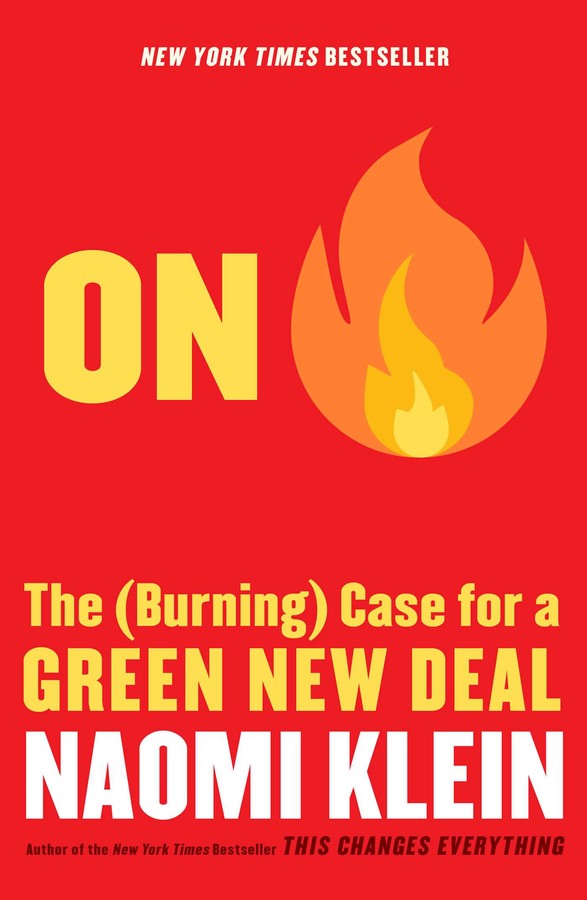
In Naomi Klein’s latest book, her career-long critique of corporate globalisation and capitalism gears up to advocate for a Green New Deal. Fortified with new material, Klein’s chosen evidence traverses excerpts from her prolific work over the past decade, from reflections on a potentially radical Vatican to dispatches from a smoke-choked British Columbia. Set against a backdrop of stubborn political inaction on climate, spiralling inequalities, and an increasingly assertive far right, hope grows in parallel with urgency as a plan for change emerges in the nick of time.
In November 2018, activists from the Sunrise movement gathered in Washington to call for a Green New Deal. Their friendly reception among young progressive democrats – a “new political breed” – was followed just three months later by the launch of Alexandria Ocasio-Cortez and Ed Markey’s formal resolution on a Green New Deal. Published in September 2019, the timing of Klein’s latest release ahead of the 2020 US presidential race is unmistakable.
On Fire is not a roadmap for a Green New Deal and does not seek to flesh out its more practical aspects as others have done (see Ann Pettifor or Jeremy Rifkin). Rather, it makes the overarching case for how rapid decarbonisation represents a “once-in-a-century chance” to fix our deeply flawed economic model, and why a Green New Deal is our best shot at doing so. Essentially, this involves profound civilisational transformation to reconfigure society and put forth an alternative worldview embedded in interdependence, reciprocity, and cooperation. Way more than solar panels and wind turbines, the Green New Deal is about structural change simultaneously targeting the multiple interlocking crises of our times: ecological, socio-economic, and democratic.
This kind of change requires a deeply intersectional approach. For Klein, the power of the Green New Deal lies in its ability to “raise an army of supporters” by weaving together into one unshakable climate coalition the threads of various movements: environmental, workers’, anti-racist, feminist, democratic, indigenous, and many more.
The Green New Deal faces a perilous road ahead. Klein’s latest book serves as a pressing reminder that any plan for ecological transition must keep climate justice at its core if it is to stand a fighting chance of tackling the crises we face. At a time when “climate barbarism” looms, there is much at stake.
Ecofeminism by Maria Mies & Vandana Shiva (2014, Zed Books, 2nd edition)
A REVIEW BY CYRIELLE CHATELAIN
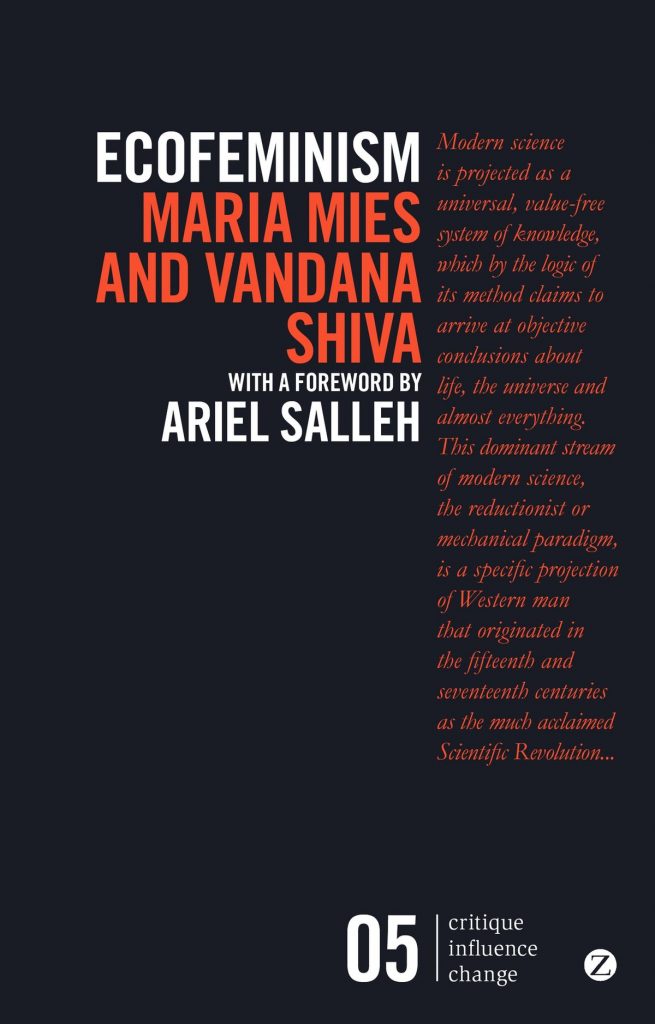
The word “ecofeminism” was coined in 1974 by Françoise d’Eaubonne in her book Le Féminisme ou la Mort (Feminism or Death). She believed that the feminist and environmental movements should converge, and introduced the idea that the subjugation of women and their bodies is the product of the same capitalist and patriarchal system that exploits nature. In a work first published in 1993, Maria Mies and Vandana Shiva pursue the thinking of the 1970s on the need to create a new worldview that fully recognises the interdependence of every living thing, and to question a system that feeds on the colonisation of living things and the earth.
Maria Mies is a German sociologist; Vandana Shiva is an Indian physicist, activist, and writer. Shiva is known for her activism in support of small farmers and against GMOs and the patenting of living organisms, and was awarded the Alternative Nobel Prize in 1993. Their work fuses the perspectives of feminist activists who have studied and fought the capitalist system from different positions – the heart of the West for one, the exploited Global South for the other. Through a critical analysis of the patriarchal and neocolonial capitalist system, Shiva and Mies seek to highlight and deconstruct three closely linked processes of domination: the colonisation of the South by the North, the domination of women by men, and the exploitation and destruction of nature by humans.
These three processes follow the same logic: a devaluation of what is considered natural and a naturalisation of what is “other” than the Western white man; a negation of domestic or subsistence labour; the colonisation of land and bodies by Westerners, presented as a phase of development; and the delegitimisation of any claim to customary rights or alternative ways of life. These essays illuminate urgent issues such as environmental justice, the distribution of natural resources, and the unsustainable nature of Western consumption. Mies and Shiva have contributed to today’s revival of ecofeminism and to the development of a decolonial feminist thinking – in the academic, activist, and political spheres – which continues to seek paths towards emancipation from a predatory and deadly system.
Fossil Capital: The Rise of Steam Power and the Roots of Global Warming by Andreas Malm (2016, Verso)
A REVIEW BY FRANÇOIS JARRIGE
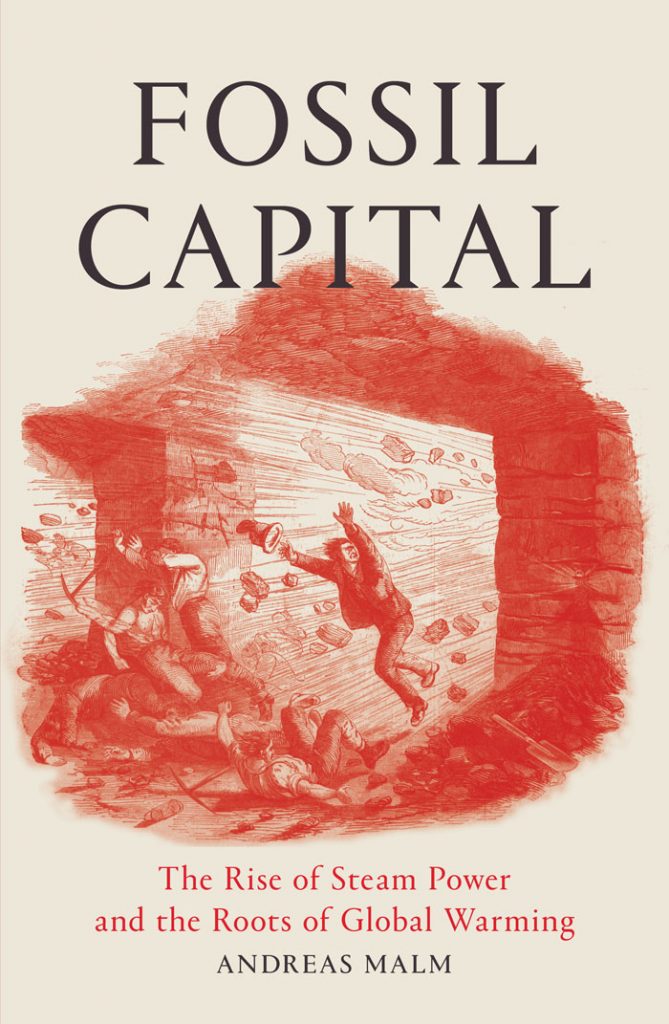
The work of the Swedish historian and philosopher Andreas Malm over the past 10 years helps us cut through some of the complexity surrounding the energy crisis. Malm’s approach is an activist one, rooted in historical materialism and the study of societal power relationships, all based on solid empirical research.
In response to the global ecological crisis, thinkers influenced by climate science and chemistry have proposed calling today’s epoch – in which humanity becomes a geological force in its own right – the “Anthropocene”. Malm is a major figure in contemporary ecological Marxism, which considers that the accumulation of capital leads to the destruction of living processes. His proposal is to replace the concept of the Anthropocene with that of the “Capitalocene”, a term all the more enlightening when considering the historical trajectory of “fossil capital”.
Malm’s thinking on the origins of fossil capital began with an ambitious work analysing the history of an iconic machine, the steam engine. Fossil Capital: The Rise of Steam Power and the Roots of Global Warming (2016, Verso) reinterprets the story of steam technology through the prism of the social and political relationships which the new technology engendered. According to Malm, fossil fuels are a “microcosm of unequal social relationships”. For instance, the cotton industry’s switch to coal in the 1830s was primarily due to social factors. Whereas the management of water resources had been characterised by collective discipline, the steam engine offered a flexible and individualistic source of energy that fitted well with the ideology of English textile capitalism in the 1830s. Malm goes further, looking at the “fossil empire” and how Britain used steamboats and railways to subjugate the peripheries of the 19th-century world economy – places like India, Egypt, and western Africa, all at the forefront of today’s climate risks.
In his more recent The Progress of this Storm (published 2017), Malm proposes a new “epistemology of climate realism”. The thread of political theory running through Malm’s work consists of reimagining nature in order to work with it. In his view, nature is neither a part of the world free from human intervention nor a hybrid artefact built by humans; it is what resists, what underpins our condition. Malm ultimately shows how the global ecological crisis is the result of contingent historical choices and the outcome of an increasingly unequal and destructive global capitalism. This historical, theoretical, and militant work is an important contribution to the growing discipline of social ecology..
credits © Green European Journal
